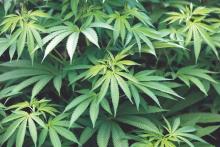Cannabis use is associated with an increased risk of later addiction to cannabis, alcohol, and other drugs, a longitudinal survey of almost 35,000 adults shows.
Dr. Carlos Blanco and his associates analyzed two waves of data from the National Epidemiologic Survey on Alcohol and Related Conditions (NESARC) from 2001-2002 and 2004-2005. They found that, among respondents who used cannabis in the past 12 months, the risk of developing any substance use disorder (odds ratio, 8; 95% confidence interval, 6.9-9.2) was higher than the risk of developing any mood (OR, 2.1; 95% CI, 1.8-2.0) or anxiety disorder (OR, 1.9; CI, 1.6-2.3). Similar trends were found for the risk of alcohol use disorder (OR, 7.3; 95% CI, 6.3-8.6) and nicotine dependence (OR, 4.2; 95% CI, 3.6-4.9). The investigators also found a dose-response effect; more frequent cannabis use was tied to a greater risk of later addiction.
Together, the findings suggest caution in implementing policies tied to the legalization of cannabis for recreational use, noted Dr. Blanco of the National Institute on Drug Abuse, Bethesda, Md. Adverse outcomes such as substance use disorders “should be taken under careful consideration in clinical care and policy planning.”
Find the full study in JAMA Psychiatry: (2016 Feb 17. doi: 10.1001/jamapsychiatry.2015.3229)


